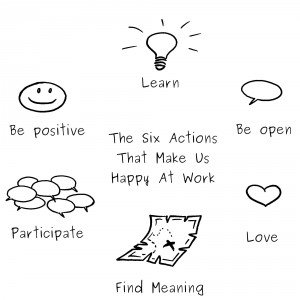
Are you a person who derives happiness from work? Do you embrace the small successes that you have, or do you keep pushing yourself more and more without feeling any real sense of accomplishment? If you have a constant, subtle undercurrent of negativity at work, it can prove to be quite destructive to your psyche. It may affect how you energize yourself in your quest to get to your full potential.
We now know that to achieve the highest business outcomes, we need to have a happy and engaged workforce. But what are the best ways to fight the frustrations that can burden us at work and affect productivity? One recent theory that has been proposed attempts to boost our happiness quotient at work and to look at the internal lens that we view work life experiences, and how we become more resilient in dealing with negative events.
In a recent TED talk called the Happy Secret to Better Work, Shaun Achor talks about how using positive psychology can help all of us to become happier at work, and actually flourish. The movement of positive psychology proposes the idea that we should study not just what makes us unhealthy psychologically. We also should study what makes us become happier and healthier.
YouTube Special Feature
The concept of positive psychology is rooted in humanistic psychology, and it states that people have the power to reframe life experiences to help us to be more productive and positive. How we think about our life experiences both negative and positive can have a large impact on how happy we are. Our level of happiness cannot always be fully explained by our life events. How we view the life events is very important. Many people will tend to focus too much on negative events, which could be due to the process of evolution.
So, we may downplay our successes and we do not draw as much energy from them as we should. On one level, we are giving up some of our ability to be happy, because we allow our happiness to depend entirely on what is happening outside of us. In reality, our internal state can be very influential on how happy we are, regardless of what is going on outside of us.
How we try to find happiness at work does not always line up with how our brains operate. We often seek success to make us happy. But in reality, we should look for happiness first and foremost, and then success is more likely to come after that. The reason for this is that happiness boosts the dopamine release in our brains and this can activate our centers of learning in the brain. This will cause us to absorb more information. We learn much more and work more effectively when we are happy.
The TED talk mentioned above stresses that we should not move our goal posts for happiness on a regular basis. Do not push those goal posts further and further out based upon what we accomplish. You should not be pushing happiness beyond the horizon. Of course, it is not realistic to expect that we will never feel disappointment or negative feelings. But, a positive outlook on life can definitely help us to process the negative events more quickly and get back to being happy.
Some ideas to make us live happier:
- Be aware of the present: Do not focus too much on negative events from the past. Look for chances to be positive right now.
- Celebrate the little successes: Do not ignore the small steps that lead to some of your bigger accomplishments.
- Play to your strengths: Find a career or job that stresses what you are good at. This can really make you feel more positive.
- Be aware of good performance: Do you manage others? Be sure to reach out to people who are doing well and validate that.
- Demonstrate gratitude: Be liberal with your use of thank you’s and compliments in the workplace.
You definitely do not have to be working in the field of psychology or earning a master’s in clinical psychology to use psychology in your everyday work life!




